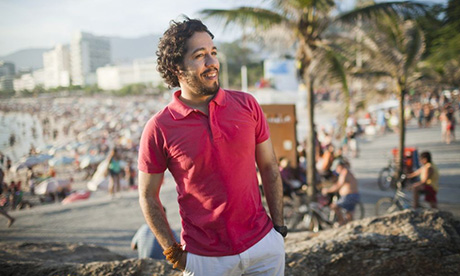
Brazil is hosting a back-to-back World Cup and Olympics. When it was announced, the then-president Luiz Inácio Lula da Silva summed up the mood. "Our hour has arrived," he proclaimed to cheers in 2009.
Few doubted it at the time. Long dismissed as the land of unfulfilled potential, Brazil appeared to be on an unstoppable winning streak. The economy was booming, poverty falling, the destruction of the Amazon was slowing and Lula was one of the most popular presidents in the world. The long-held belief that "God is Brazilian" seemed to ring true. But five years on, with Brazil's hour in the global spotlight imminent, the divine touch seems to have deserted this nation. Last June's street protests – the biggest in a generation – highlighted dissatisfaction with the dire public services, political corruption, police violence and wasteful spending on stadiums. Since 2011 the economy has slowed dramatically. Environmental concerns have been put on the back burner. Dam and mining megaprojects are eating into land owned by indigenous tribes. Conservationists appear increasingly sidelined and Amazon clearance has suffered its sharpest uptick in a decade.
Throw in delays and deaths at stadium construction sites, shoddy infrastructure, high murder rates and a presidential election, and it is clear that Brazil could come out of 2014 looking a lot worse than it went in. Just as likely, though, is that the government, now led by Dilma Rousseff, will muddle through, bend the rules a little and try to make everyone happy with a creative last-minute fudge. Such is the culture of the jeitinho Brasileiro – "the Brazilian short cut".
We can expect to weigh up that approach a great deal in 2014 as the world dwells long enough on Brazil to go beyond the old stereotypes of carnival, coffee, beaches and football.
No single image, of course, could ever do justice to this nation. More than twice as large as Europe, Brazil has a population of 199 million, made up of descendants of colonial settlers, their slaves, survivors of the indigenous tribes they decimated and 20th-century waves of migration from Japan, Lebanon, Europe and elsewhere.
The predominantly white elites of Rio de Janeiro, São Paulo and Brasilia enjoy a standard of living as good as anywhere on the planet. But the masses in megacities such as Salvador and Recife are plagued by some of the world's highest rates of murder and crack addiction. In rural areas, plantation owners have a grip on local politics in the northeast that is little short of feudal, while the soy and cattle barons of the interior push landless peasants and Indian communities further to the margins.
A more positive and common story is that of the numerous poor communities whose lives have been significantly improved in recent years by cash transfers from the government. But not everyone wants more cash and civilisation. Brazil is also still home to some of the world's last uncontacted tribes.
Fully understanding what makes such a country tick in a single story is futile. Instead, this series of interviews presents a snapshot of Brazil as it enters this pivotal year. Many of the individuals are little known in the outside world, but they highlight trends in society.
We interview, among many others, the politician who has earned plaudits for standing on a platform of gay rights. We talk to a health worker – one of many in the public sector who believes that dire services are a major cause of unrest – and a member of the Mídia Ninja collective challenging the way news organisations cover social activism.
In the world of culture, we skip samba and bossanova to meet a leading influence in funk carioca, the sound that has spread from favela parties to the mainstream. We also interview Isis Valverde, an actor and campaigner for social equality.
For a take on the spiritual life of the nation, the alternative is still further from conventionality. Brazil is often described as the world's biggest Catholic nation, but that is only half the story. Divaldo Franco, a spiritual medium who claims to speak to the dead and who has adopted more than 600 abandoned children, is among the most popular figures in the country. On the environment and human rights side we talk to a tribal leader, and for sport we introduce Caça-Rato – a striker who rose from catching rats as a child to scoring the goal that secured promotion for Santa Cruz.
We hope to introduce some intriguing characters and highlight what may well be Brazil's defining characteristic: diversity. Socially liberal, religiously conservative, politically progressive and economically divided, this country defies easy categorisation. Whether Brazil's time has indeed come, this year should at least leave the world with a broader view of what it represents.
Read the full feature in the Observer on Sunday.

